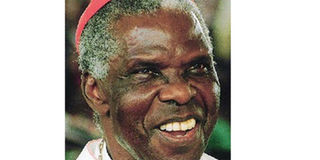Memories of Cardinal: An inspiration to many

Maurice Cardinal Otunga. Photo/FILE
What you need to know:
It would seem, therefore, that for Kenyan Catholics and people, their role now is to pray, wait and see. But the power of the person of Maurice Cardinal Otunga is such that 12 years after his death, those who knew him recall encounters that left an indelible mark on their lives.
It is 12 years since Maurice Cardinal Otunga, the much-loved Archbishop of Nairobi, died. At his funeral Mass presided over by Polycarp Cardinal Pengo of Dar-es-Salaam at Nyayo National Stadium, Nairobi, in 2003, a speaker paying tribute to the late prelate had appealed to the Catholic Church authorities in Rome to declare Cardinal Otunga a saint without delay.
But the Catholic Church has its rigorous saint-making process which can be quite unpredictable with regard to speed.
However, the road to becoming a saint is long and quite unpredictable. There have been causes that were started, never to see the light of day. A case in point is that of the Mombasa martyrs – 288 men, women and children – killed in 1631.
They died in a conflict involving Arabs, Portuguese adventurers, local Swahili and indigenous people. The Archbishop of Goa sent a petition to Rome for their canonisation.
The request was received, studied for a while, and then dropped without any reasons being given.
Some causes take centuries before eventual canonisation. Joan of Arc died in 1431. It took over 500 years before she was finally declared a saint in 1920. But other causes seem to move at supersonic speed. Pope John Paul II, who visited Kenya thrice, died in 2005. Last year, he entered the official list of saints. The process lasted less than 10 years.
REMARKABLE PROGRESS
In the case of Cardinal Otunga, the beatification process, which started in 2009, has made remarkable progress. The Kenyan phase that involved collection of evidence was completed last year. The fate of the process is now in the hands of the Congregation for the Causes of Saints in Rome.
It would seem, therefore, that for Kenyan Catholics and people, their role now is to pray, wait and see. But the power of the person of Maurice Cardinal Otunga is such that 12 years after his death, those who knew him recall encounters that left an indelible mark on their lives.
Persons he ministered to and nuns, religious brothers and priests he worked with recall with admiration, gratitude and nostalgia Cardinal Otunga’s lifestyle. Until late in life, he drove himself in a simple but decent Peugeot 304. It was only after he was involved in an accident and the old vehicle became a write-off did the Cardinal upgrade to a Peugeot 305!
Having survived the accident with a broken leg, he allowed himself to be driven as he went about his apostolate.
Cardinal Otunga was a deeply spiritual man who understood the human person as an embodied spirit. When friends gave him a considerable amount of money to spend as he wished, the result was the Resurrection Garden in Karen a place of unsurpassed art, architecture and beauty, conducive to meditation and prayer.
Recently, members of my parish and University Chaplaincy at JKUAT shared informal reminiscences of Cardinal Otunga. One member, John Ndung’u Muthee, 80, told a story of the community’s experience with the Cardinal in the late 1980s. The prelate had gone to bless a parcel of land at Gachororo, Juja, in readiness for the construction of a house of worship. After the ceremony, Cardinal Otunga invited leaders of the community to his Nairobi residence. “When you come, feel free to bring children and some young people with you,” he told the elders.
“I have never seen an event like that. He had slaughtered a he-goat for us,” Ndung’u recalled, adding that the Cardinal, while still dressed in his priestly robes, cut and distributed the meat with his own hands. I have never met a man like Cardinal Otunga,” he concluded.
Fr Lawrence Njoroge was Cardinal Otunga’s Pro-Secretary at the Holy Family Basilica (1981-82). Presently, he is Catholic Chaplain and Professor of Development Studies and Ethics at JKUAT




